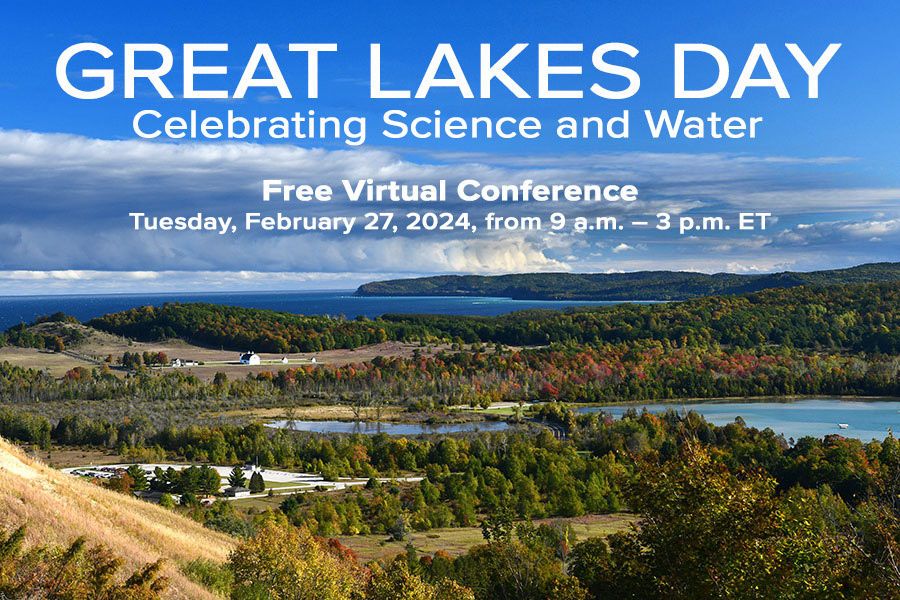Annual Great Lakes Day conference videos share info on PFAS in the Great Lakes, marine debris and more!
A playlist of individual recorded sessions are available at the Michigan Sea Grant YouTube site.

The 34th annual Great Lakes Day virtual conference held on Feb. 27, 2024, brought together Great Lakes professionals to describe their work and many issues being faced in the region.
While the annual conference has changed format over the years, its goal remains the same: To engage our audience of nonformal and formal educators, students, scientists and managers in emerging issues, Great Lakes general knowledge and science. Great Lakes issues are always an important and popular topic, and this year was no exception as more than 500 people registered to attend the conference. The conference was sponsored by Michigan Sea Grant, Michigan State University Institute of Water Research, Department of Fisheries and Wildlife, and MSU Extension as part of Agriculture and Natural Resources Week.
During the conference Michigan Sea Grant also honored Dr. Lois Wolfson with a Van Snider Award for Distinguished Partnerships. The Van Snider Award recognizes individuals and organizations that exemplify what it means to be a partner and friend of Michigan Sea Grant. Prior to her retirement, Wolfson provided 33 years of leadership as key organizer for the annual conference. Additionally, she has partnered with Michigan Sea Grant on several other projects including “Introduction to Lakes,” “Michigan Lake and Stream Leaders Institute,” and “Water School.”
The conference sessions (keynote was not recorded per speaker’s request) are available to watch via Michigan Sea Grant’s YouTube site by viewing the Great Lakes Day playlist or individual topics and sessions of interest are shown below:
- Welcome and Are you Great Lakes Literate?
- Presenters: Angela Scapini and Brandon Schroeder, Michigan Sea Grant
- Status of PFAS in the Great Lakes
- Presenter: Carolyn Foley, Illinois-Indiana Sea Grant
- The Michigan Coastal Management Program’s Pathway to Resilience
- Presenter: Adam Arend, Coastal Community Development Coordinator, Michigan Coastal Management Program, EGLE
- A Conservation Partnership in the Keweenaw Heartlands
- Presenter: Dr. Tyler Bassett, Michigan Natural Features Inventory
- Vegetation and marsh bird relationships with invasive Phragmites australis occurrence and management in Saginaw Bay
- Presenter: Dr. Rachel Hackett, Michigan Natural Features Inventory
- Marine Debris and the Great Lakes
- Presenter: Jill Bartolotta, Ohio Sea Grant
- What can YOU do? Practical ideas to help and communicate about our Great Lakes
- Presenters: Brandon Schroeder and Cindy Hudson, Michigan Sea Grant
Michigan Sea Grant helps to foster economic growth and protect Michigan’s coastal, Great Lakes resources through education, research and outreach. A collaborative effort of the University of Michigan and Michigan State University and its MSU Extension, Michigan Sea Grant is part of the NOAA-National Sea Grant network of 34 university-based programs.
This article was prepared by Michigan Sea Grant under award NA22OAR4170084 from the National Oceanic and Atmospheric Administration, U.S. Department of Commerce through the Regents of the University of Michigan. The statement, findings, conclusions, and recommendations are those of the author(s) and do not necessarily reflect the views of the National Oceanic and Atmospheric Administration, the Department of Commerce, or the Regents of the University of Michigan.



 Print
Print Email
Email

